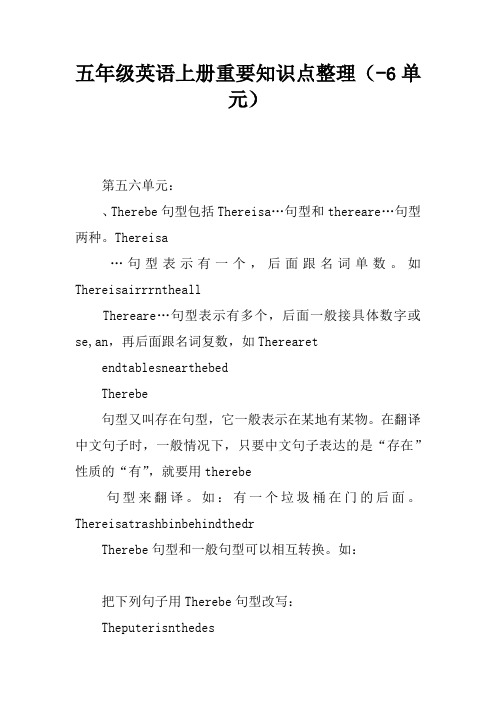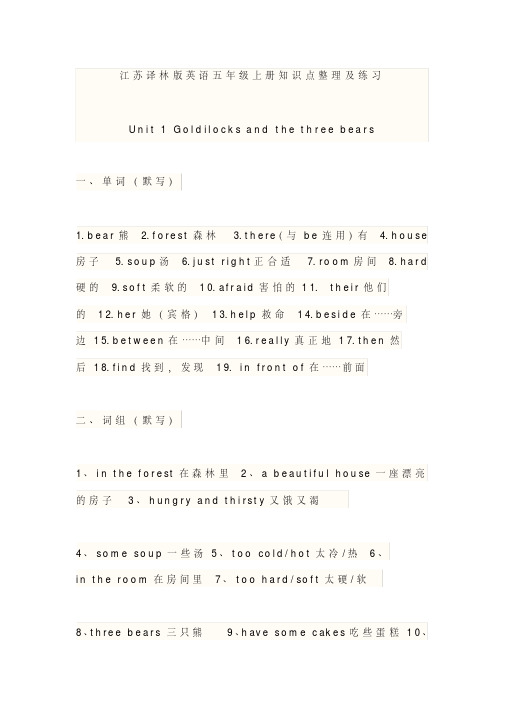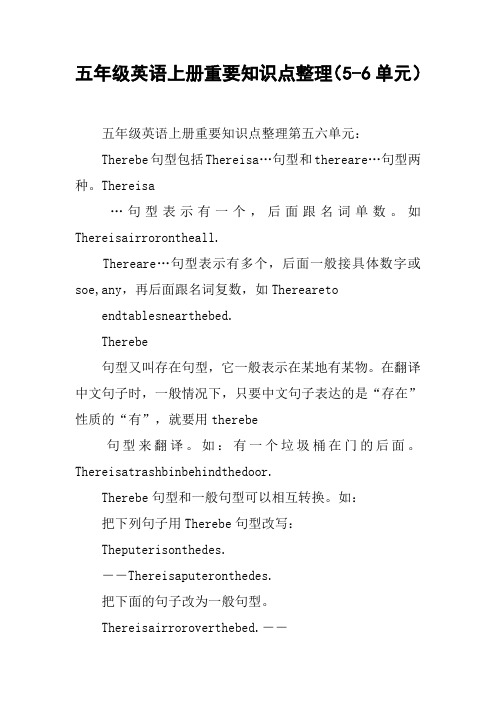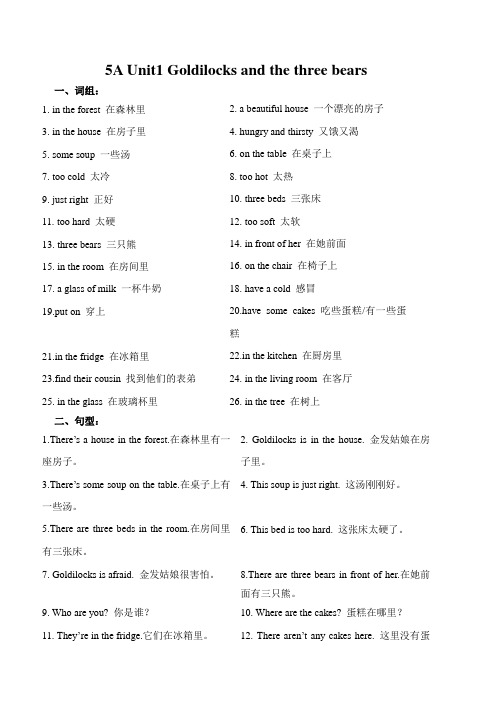五年级上英语知识整理-5、6单元|译林版
- 格式:doc
- 大小:33.50 KB
- 文档页数:7

译林版英语五年级上册知识点整理Unit 5一、单词1.bike:自行车2.road:路3.hill:山丘4.grass:草5.river:河流6.boat:小船7.fish:鱼8.bridge:桥9.cloud:云10.sun:太阳11.moon:月亮12.star:星星13.forest:森林14.flower:花15.butterfly:蝴蝶16.bird:鸟17.tree:树18.fruit:水果二、短语1.ride a bike:骑自行车2.go up and down:上上下下3.under the bridge:在桥下4.in the river:在河里5.count the stars:数星星6.swim in the river:在河里游泳7.run in the forest:在森林里跑步8.pick flowers:采花9.watch the birds:观鸟10.climb a hill:爬山丘11.fly like a bird:像鸟一样飞翔12.catch a fish:钓鱼三、句型1.Can you ride a bike?(你能骑自行车吗?)2.I can ride a bike.(我能骑自行车。
)3.What can you see?(你能看见什么?)4.I can see a river.(我能看见一条河流。
)5.Where can we ride our bikes?(我们能在哪里骑自行车?)6.We can ride our bikes on the road.(我们能在路上骑自行车。
)7.How many hills can you see?(你能看见多少山丘?)8.I can see two hills.(我能看见两座山丘。
)9.Can you swim in the river?(你能在河里游泳吗?)10.No, I can’t.(不行,我不能。
)11.Where can we pick flowers?(我们能在哪里采花?)12.We can pick flowers in the grass.(我们能在草地上采花。

五年级英语上册重要知识点整理(-6单元)第五六单元:、Therebe句型包括Thereisa…句型和thereare…句型两种。
Thereisa…句型表示有一个,后面跟名词单数。
如ThereisairrrntheallThereare…句型表示有多个,后面一般接具体数字或se,an,再后面跟名词复数,如TherearetendtablesnearthebedTherebe句型又叫存在句型,它一般表示在某地有某物。
在翻译中文句子时,一般情况下,只要中文句子表达的是“存在”性质的“有”,就要用therebe句型来翻译。
如:有一个垃圾桶在门的后面。
ThereisatrashbinbehindthedrTherebe句型和一般句型可以相互转换。
如:把下列句子用Therebe句型改写:Theputerisnthedes――Thereisaputernthedes把下面的句子改为一般句型。
Thereisairrrverthebed――Theirrrisverthebed2、Therebe句型中使用单数句式还是复数句式遵循就近原则。
即离There 最近的名词是单数时用Thereisa …离There最近的名词是复数时,用Thereare…,不管最后面的名词是单词还是复数,都不去管它,如:(1)有一个讲台和许多桌在教室里。
Thereisateaher’sdesandandessinthelassr有许多桌和一个讲台在教室里。
Thereareandessandateaher’sdesinthelassr3、n与ver的区别:n 在…上面。
表示与下面的物体互相接触,紧挨着。
ver在…上面,表示与下面的物体不接触,两个物体之间有一定的距离。
20、Therebe的单数形式在变为一般疑问句时,将助动词be提前,与there交换位置,如句中有第一人称代词,变为第二人称,将句末的句号变为问号,其他不变。
如:Thereisalsetnearthebed----Istherealsetnearthebed? Thereisariverinvillage----Isthereariverinurvillage?Therebe的复数形式在变为一般疑问句时,将助动词be 提前,与there交换位置,然后将句中se或an变为an, 如句中有第一人称代词,变为第二人称,再将句末的句号变为问号,其他不变。

江苏译林版英语五年级上册知识点整理及练习U n i t1G o l d i l o c k s a n d t h e t h r e e b e a r s一、单词(默写)1.b e a r熊2.f o r e s t森林3.t h e r e(与b e连用)有4.h o u s e 房子5.s o u p汤6.j u s t r i g h t正合适7.r o o m房间8.h a r d 硬的9.s o f t柔软的10.a f r a i d害怕的11.t h e i r他们的12.h e r她(宾格)13.h e l p救命14.b e s i d e在……旁边15.b e t w e e n在……中间16.r e a l l y真正地17.t h e n然后18.f i n d找到,发现19.i n f r o n t o f在……前面二、词组(默写)1、i n t h e f o r e st在森林里2、a b e a u t i f u l h o u se一座漂亮的房子3、h u n g r y a n d t h i r s t y又饿又渴4、s o m e s o u p一些汤5、t o o c o l d/h o t太冷/热6、i n t h e r o o m在房间里7、t o o h a r d/so f t太硬/软8、t h r e e b e a r s三只熊9、h av e s o m e c ak e s吃些蛋糕10、i n t h e k i t c h e n在厨11、i n t h e f r i d g e在冰箱里12、f i n d t h e i r c o u s i n发现他们的表弟三、句型(默写)1.T h e r e i s a h o u s e i n t h e f o r e s t.在森林里有一个房子。
2.T h e r e i s s o m e s o u p o n t h e t a b l e.在桌子上有一些汤。

Unit1知识点单词bear熊forest森林there(与be连用)有house房子sou p汤just right正合适,正好room房间har d硬的soft柔软的afraid害怕的in front of在…前面her她(宾格)Help!救命啊!betw een在…之间beside在…旁边really真的then然后find找到,发现their他们的,她们的,它们的词组goldilocks and the three bears金发女孩和三只熊in the forest在森林里a beautiful house一幢漂亮的房子hungry and thirsty又饿又渴tired and thirsty又累又渴too cold/ho t太冷/热just right正好,正合适very har d/soft非常硬/柔软be tired累了be afraid害怕beside the house在房子旁边betw een the desks在课桌之间in front of h e r/h im/me/t h e m在她/他/我/她们前面have a cold得了感冒pu t on your coats穿上你的衣服in Western countries在西方国家in China在中国find their cousin找到他们的表妹/弟易错词组betw een the trees在树之间(参照物必须是两个)in front of+宾语(介词后面使用宾语)the cakes in the fridge冰箱里的蛋糕three bears in front of me我前面的三只熊some sou p on the table桌子上的一些汤in front of the window在窗户前面under the chair在椅子下面how many+名词复数句型1.What a beautiful house!多漂亮的一座房子啊!2.How beautiful the house is!3.The s ou p is too cold.这汤太冷了。

五年级英语上册重要知识点整理(5-6单元)五年级英语上册重要知识点整理第五六单元:Therebe句型包括Thereisa…句型和thereare…句型两种。
Thereisa…句型表示有一个,后面跟名词单数。
如Thereisairrorontheall.Thereare…句型表示有多个,后面一般接具体数字或soe,any,再后面跟名词复数,如Therearetoendtablesnearthebed.Therebe句型又叫存在句型,它一般表示在某地有某物。
在翻译中文句子时,一般情况下,只要中文句子表达的是“存在”性质的“有”,就要用therebe句型来翻译。
如:有一个垃圾桶在门的后面。
Thereisatrashbinbehindthedoor.Therebe句型和一般句型可以相互转换。
如:把下列句子用Therebe句型改写:Theputerisonthedes.――Thereisaputeronthedes.把下面的句子改为一般句型。
Thereisairroroverthebed.――Theirrorisoverthebed.Therebe句型中使用单数句式还是复数句式遵循就近原则。
即离There 最近的名词是单数时用Thereisa ….离There最近的名词是复数时,用Thereare…,不管最后面的名词是单词还是复数,都不去管它,如:有一个讲台和许多课桌在教室里。
Thereisateacher’sdesandanydessintheclassroo.有许多课桌和一个讲台在教室里。
Thereareanydessandateacher’sdesintheclassroo.on与over的区别:on 在…上面。
表示与下面的物体互相接触,紧挨着。
over在…上面,表示与下面的物体不接触,两个物体之间有一定的距离。
0、Therebe的单数形式在变为一般疑问句时,将助动词be提前,与there交换位置,如句中有人称代词,变为第二人称,将句末的句号变为问号,其他不变。

5A Unit1 Goldilocks and the three bears一、词组:1. in the forest 在森林里2. a beautiful house 一个漂亮的房子3. in the house 在房子里4. hungry and thirsty 又饿又渴5. some soup 一些汤6. on the table 在桌子上7. too cold 太冷8. too hot 太热9. just right 正好10. three beds 三张床11. too hard 太硬12. too soft 太软13. three bears 三只熊14. in front of her 在她前面15. in the room 在房间里16. on the chair 在椅子上17. a glass of milk 一杯牛奶18. have a cold 感冒19.put on 穿上20.have some cakes 吃些蛋糕/有一些蛋糕21.in the fridge 在冰箱里22.in the kitchen 在厨房里23.find their cousin 找到他们的表弟24. in the living room 在客厅25. in the glass 在玻璃杯里26. in the tree 在树上二、句型:1.There’s a house in the forest.在森林里有一座房子。
2. Goldilocks is in the house. 金发姑娘在房子里。
3.There’s some soup on the table.在桌子上有一些汤。
4. This soup is just right. 这汤刚刚好。
5.There are three beds in the room.在房间里有三张床。
6. This bed is too hard. 这张床太硬了。
7. Goldilocks is afraid. 金发姑娘很害怕。
牛津译林版五年级上册英语知识点清单必会单词短语句子大全Unit 1 单元知识【词组】1.in the forest 在森林里2.in the house在房子里3.hungry and thirsty又饿又渴4.some soup一些汤5.on the table在桌子上6.too cold 太凉7.too hot太热8.just right正好9.in the room在房间里10.too hard太硬11.too soft太软12.be afraid害怕的13.three bears三只熊14.in front of her在她的前面15.put on your coats穿上你的外套16.in China在中国17.have some cakes吃一些蛋糕18.in the kitchen 在厨房里19.in the fridge 在冰箱里20.find their cousin 找到他们的表弟【句子】1.There is a house in the forest.森林里有一座房子。
2.What a beautiful house!多么漂亮的一座房子啊!3.There is some soup on the table.桌子上有一些汤。
4.This soup is just right.这汤正好。
5.There are three beds in the room.房间里有三张床。
6.This bed is too hard.这张床太硬了。
7.You can have some cakes.你可以吃一些蛋糕。
8.Where are the cakes?蛋糕在哪里?9.Bobby cannot see any cakes in the fridge.博比在冰箱里一块蛋糕都没见。
10.There aren’t any cakes here.这里一块蛋糕都没有。
【语法知识】There be 句型的用法:(1)there be句型,意思是有,表示某处有某人或某物。
五年级英语上册(译林牛津5A)知识点总结知识点总结Unit 1 Goldilocks and the three bears 一、单词(默写)1熊bear2森林forest3(与be 连用)有there4房子house5汤soup6正合适just right7房间room8硬的hard9柔软的soft10害怕的afraid11他们的their12她(宾格)her13救命help14在??旁边beside15在??中间between16真正地really17然后then18找到,发现find19在??前面in front of二、短语(默写)1在森林里in the forest2一座漂亮的房子 a beautiful house3又饿又渴hungry and thirsty4一些汤_ some soup5太冷too cold6太热too hot7三只熊three bears8太硬too hard9在她前面in front of her10太软too soft11在我前面in front of me12找到他们的表弟find their cousin13在西方国家in Western countries14吃些蛋糕have some cakes15在玻璃杯里in the glass16穿上你们的外套put on your coats17在桌子上on the table18在中国in China19正合适,正好just right20在树上(外来)in the tree21在房间里_ in the room22得了感冒Have a cold23一杯牛奶 a glass of milk24在厨房里_ in the kitchen25在课桌之间_ between the desks26在冰箱里,in the fridge27在盒子里in the box三、句型(默写)1There is a house in the forest.在森林里有一个房子。
译林五年级英语知识点(实用6篇)译林五年级英语知识点第1篇Unit 5 Helping our parents词汇clean擦,洗busy忙,忙碌sweet甜的cook烧,煮garden花园,果园parent父或母pest害虫grow种植ladybird瓢虫词组sweep the floor扫地make the bed整理床铺wash the dishes洗碗clean the car擦车子cook breakfast做早饭in the living room在客厅 in the afternoon在下午clean the table擦桌子watch TV看电视grow grapes种葡萄big and sweet又大又甜help him帮助他in the kitchen在厨房in his bedroom在他的卧室里 cook dinner做晚饭eat fruit吃水果wash clothes洗衣服in his garden在他的果园里 on the grapes在葡萄上some ladybirds一些瓢虫go away离开,走了so sweet如此甜句型I am doing…我正在做……He is doing…他正在做……She is doing…她正在做……We are doing…我们正在做……They are doing…他们正在做……I'm helping我正在帮助他。
My mother is cooking breakfast in the 我妈妈正在厨房做早饭。
What is he doing now?他现在正在做什么?What are we doing now?我们现在正在做什么?Helen and I are helping我和海伦正在帮助她。
Helen is washing the海伦正在洗碗。
They are eating fruit in the living 他们正在客厅吃水果。
江苏译林(牛津)版英语五年级上册知识点整理……中间16.really真正地17.then然后18.find找到,发现19. in front of在……前面二、词组(默写)1、in the forest在森林里2、 a beautiful house一座漂亮的房子3、hungry and thirsty又饿又渴4、some soup一些汤5、too cold/hot太冷/热6、in the room在房间里7、too hard/soft 太硬/软8、three bears 三只熊9、have some cakes吃些蛋糕10、in the kitchen在厨11、in the fridge 在冰箱里12、find their cousin发现他们的表弟三、句型(默写)1. There is a house in the forest.在森林里有一个房子。
2. There is some soup on the table.在桌子上有一些汤。
3. There are three bears in front of her.在她前面有三只熊。
4. This soup is too cold.这汤太冷了。
5. What a beautiful house! 多么漂亮的房子!6. She is hungry and thirsty.她是又饿又渴。
7.Bobby cannot(can’t) see any cakes in the fridge. 波比看不到冰箱里有蛋糕。
四.语法点(理解)1.There be句型表示“某处有某物”(1)其中there is 用于单数名词或不可数名词,如:There is a pencil case in the school bag. There is some soup/milk /tea/coffee/juice/water/chocolate. (2)There are用于可数名词的复数,如:There are some desks in the classroom.(3)There be 句型的就近原则:be动词后面如果跟的是不止一种物品,就根据离它最近的物品选用is或are.如:There are some pictures and a telephone. There is a telephone and some pictures.2.There be 句型的否定形式:在be动词的后面加not(is not可以缩写为isn't,are not可以缩写为aren't)把some 改成any。
译林版英语五年级上册知识点整理5、6单元Unit5 What do they do【单词】a cook 一个厨师 a doctor 一个医生 a driver 一个驾驶员 a farmer 一个农民a nurse 一个护士 a policeman 一个警察 a teacher 一个老师 a worker 一个工人1. teacher 老师2. teach 教3. writer 作家4.write写 5.work 工作6.at home 在家7.doctor 医生8.help 帮助9.sick 生病10.people 人,人们11.factory 工厂12.worker 工人13.cook 厨师14.driver 驾驶员,司机15.farmer 农民16.nurse 护士17.policeman 警察【词组】1. teach English 教英语2. a lot of students =lots of students 许多学生3. What about...?= How about....? ....怎么样4. an English teacher 一位英语教师5. write stories 写故事6. work at home 在家工作7. help sick people 帮助生病的人8. a factory worker 一个工厂工人9. make sweets 做糖果10. a lot of sweets 许多糖果11. a nice car 一辆漂亮的小汽车12. make cars 制造汽车13. so many cars 这么多汽车14. fly in the sky 在空中飞15. I wish 我希望【句子】1. What does your father do? 你的爸爸做什么的?2. My father is a teacher. 我的爸爸是个老师。
3. He teaches English. 他教英语。
4. He has a lot of students. 他有许多学生。
5. What about your mother? 你妈妈呢?6. Is she an English teacher too? 她也是个英语老师吗?7. She’s a writer.她是个作家。
8. She writes stories. 她写故事的。
9. She works at home. 她在家工作。
10. My father is a doctor. 我的爸爸是个医生。
11. He helps sick people. 他帮助生病的人。
12. My mother is a factory worker. 我的妈妈是个工厂的工人。
13. She makes sweets. 她做糖果的。
14. Who’s that?那是谁?15. There are so many cars. 有那么多车。
16. Your father can’t go now.你爸爸不能走了现在。
【语法知识】1. 如何询问他人的职业1)What does + 某人(your father, David...)do ?He / She is a / an +职业(farmer, teacher, doctor...)例如:What does your father do? He is a doctor. 你爸爸做什么的?他是一个医生。
还可以这么问他人的职业:2)What is + 某人?What is your father? 你爸爸做什么的?3)What’s somebody’s job?What’s your father’s job? 你爸爸做什么的?2. 询问“你”的职业1) What’s your job? 你是做什么的?I am an English teacher. 我是一个英语老师。
2)What do you do? 你是做什么的I am a worker. 我是一名工人。
动词在第三人称单数形式的变化规则规则例词一般情况下,直接在动词的词尾加-s。
run - runs look - looks see -sees say -says以-s, -sh, -ch, -x, -o结尾的动词,一般在词尾加-es. teach-teaches go-goes fix-fixeswash-washes pass-passes以辅音字母加y结尾的动词,先边y为i, 再加-es. study-studies try- tries以元音字母加y结尾的动词,直接在词尾加-s。
play-plays stay-stays 注意:go(三单)——goes have(三单)——has五、作文My familyThere are three people in my family. They are my father , my mother and I . My father is a teacher. He works in a school. He goes to school by car. My mother is a doctor. She works in a hospital. She helps sick people. She likes reading books. I am a student. I like playing football . I love my family.Unit 6 知识点梳理一、词汇my e-friend 我的网友in the playground 在操场上wait a minute 等一会send this email 发这封电子邮件live in the UK 住在英国eleven years old 11岁speak Chinese 讲中文have Chinese lessons 有语文课atschool 在学校study Chinese 学习汉语after school 放学后what subjects 什么学科like Maths and PE 喜欢数学和体育don’t worry 别担心swimwell 游得好eat fish 吃鱼at a snack bar 在一家小吃店go fishing 去钓鱼be good at fishing 擅长钓鱼teach you 教你sit by the river 坐在河旁many fish 许多鱼live in Canada 住在加拿大be good at English 擅长英语in Australia 在澳大利亚in China 在中国tomorrow morning 明天早上☆know about these countries 了解这些国家☆in winter 在冬天☆turn to ice 变成冰☆the winter weather 冬天的天气☆wear warm clothes 穿暖和的衣服☆Chinese addresses 中文地址☆write English addresses 写英文地址☆know about your e-friends 了解你的网友们二、句型1. Do you have an e-friend? 你有一位网友吗?Yes, I do. 是的,我有。
2. Do they like swimming? 他们喜欢游泳吗?No, they don’t. 不,他们不喜欢。
3. Does he have Chinese lessons? 他有语文课吗?Yes, he does. 是的,他有。
4. Does she like singing? 她喜欢唱歌吗?No, she doesn’t. 不,她没有。
5. What subjects does he like? 他喜欢什么学科?He likes Maths and PE. 他喜欢数学和体育。
6. What subjects does she like? 她喜欢什么学科?She likes Music and Art.她喜欢音乐和美术。
7. Let me send this email to my e-friend. 让我给网友发个电子邮件。
8. Where does he live? 他住在哪里?He lives in the UK. 他住在英国。
9. How old is he? 他几岁了?He’s 11 years old. 他11岁。
10. Can he speak Chinese? 他会讲汉语吗?Yes, he can. 是的,他会。
11. What does he do after school? 放学后他做什么?He studies Chinese. 他学汉语。
12. What do fish eat? 鱼吃什么?They eat apples. 它们吃苹果。
13. Bobby waits and waits. 波比等呀等。
14. Let’s go fishing tomorrow.让我们明天去钓鱼。
I can teach you. 我会教你。
☆15. In winter, water turns to ice. 在冬天,水变成冰。
☆16. And sometimes it snows. 有时候下雪。
☆17. We write Chinese addresses like this. 我们像这样写中文地址。
三、语音Ww / w/ watch water week winter woman weather we always wear warm write swing wing with wet work worker wait worry四、语法1. Does he / she …?一般疑问句句中没有be动词,变为一般疑问句要借助助动词do / does。
助动词形态由主语的人称决定。
Does he / she …?主语为第三人称单数,用does其结构为:Does +主语+谓语动词+其他?2. What subjects does … like? 特殊疑问句这个句子用来询问他人喜欢什么科目的疑问句。
用于第三人称单数,在本句中用助动词does。
注意回答时like后面要加s。